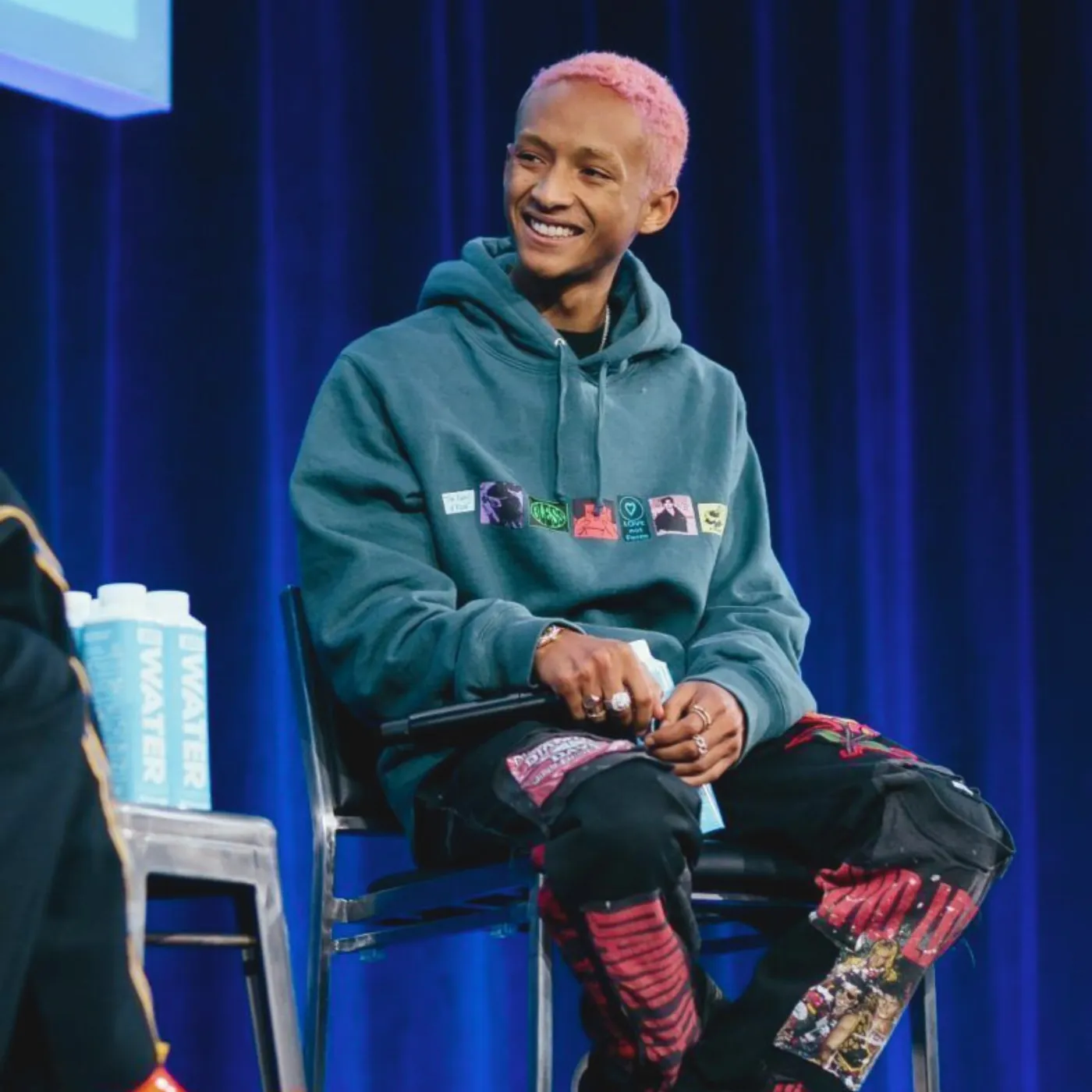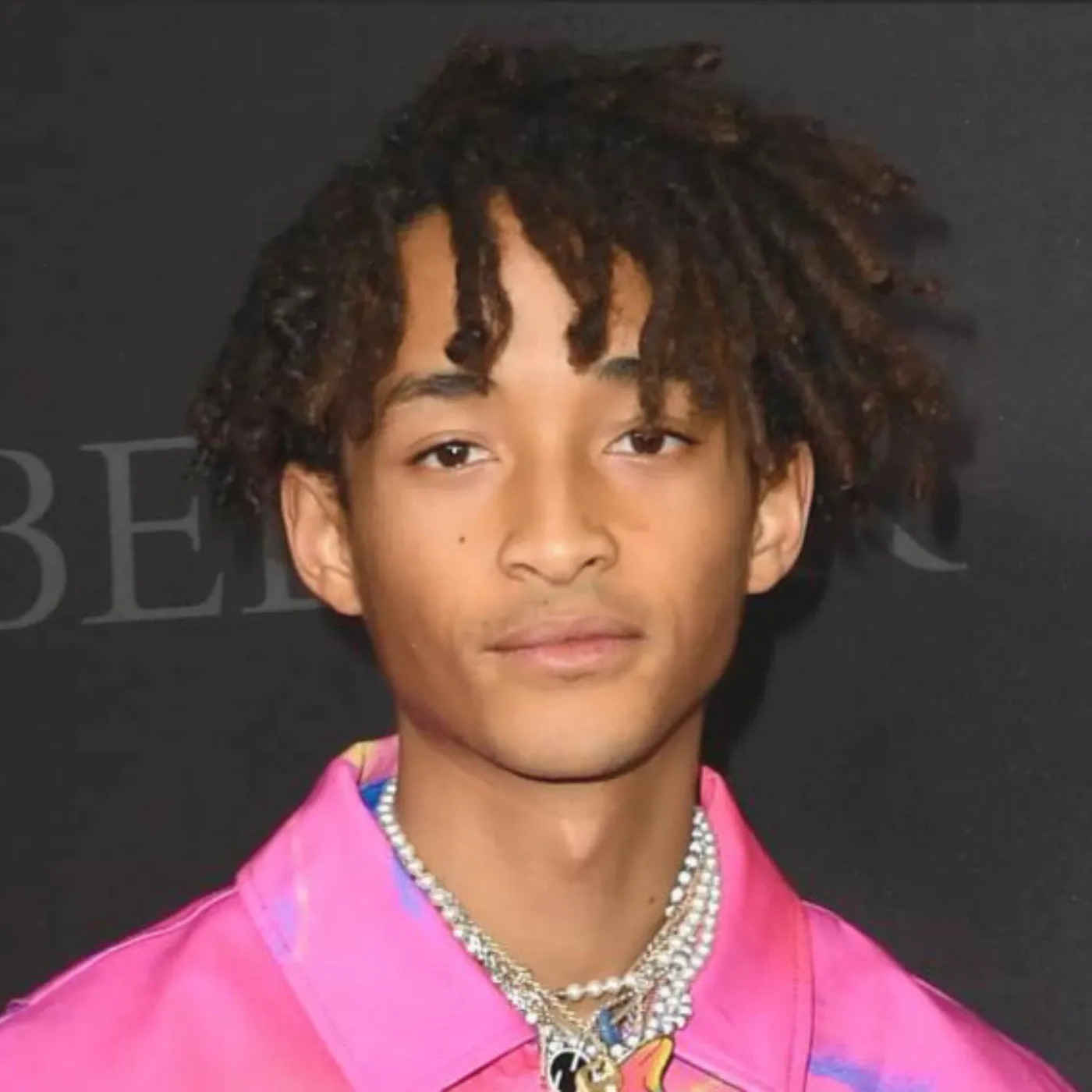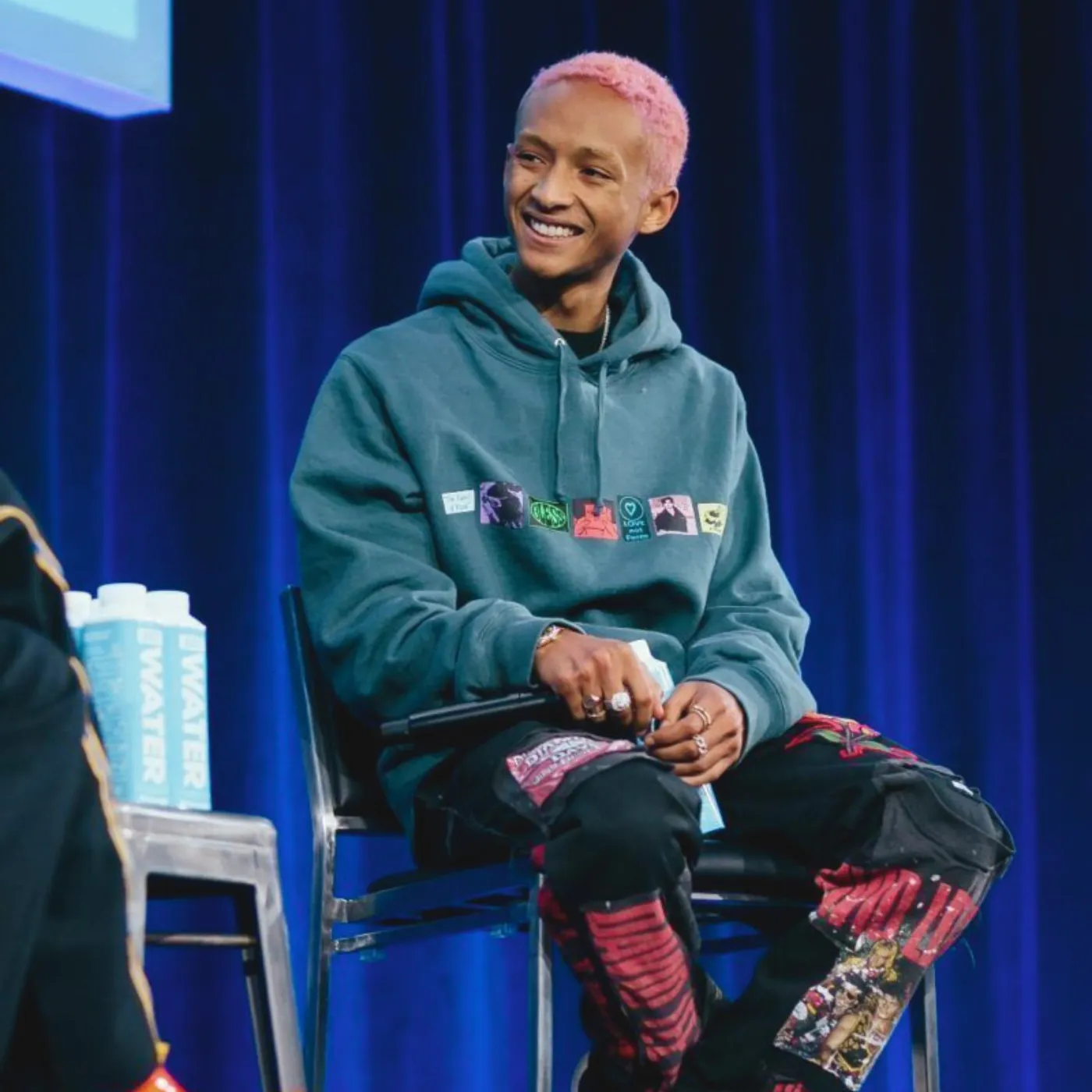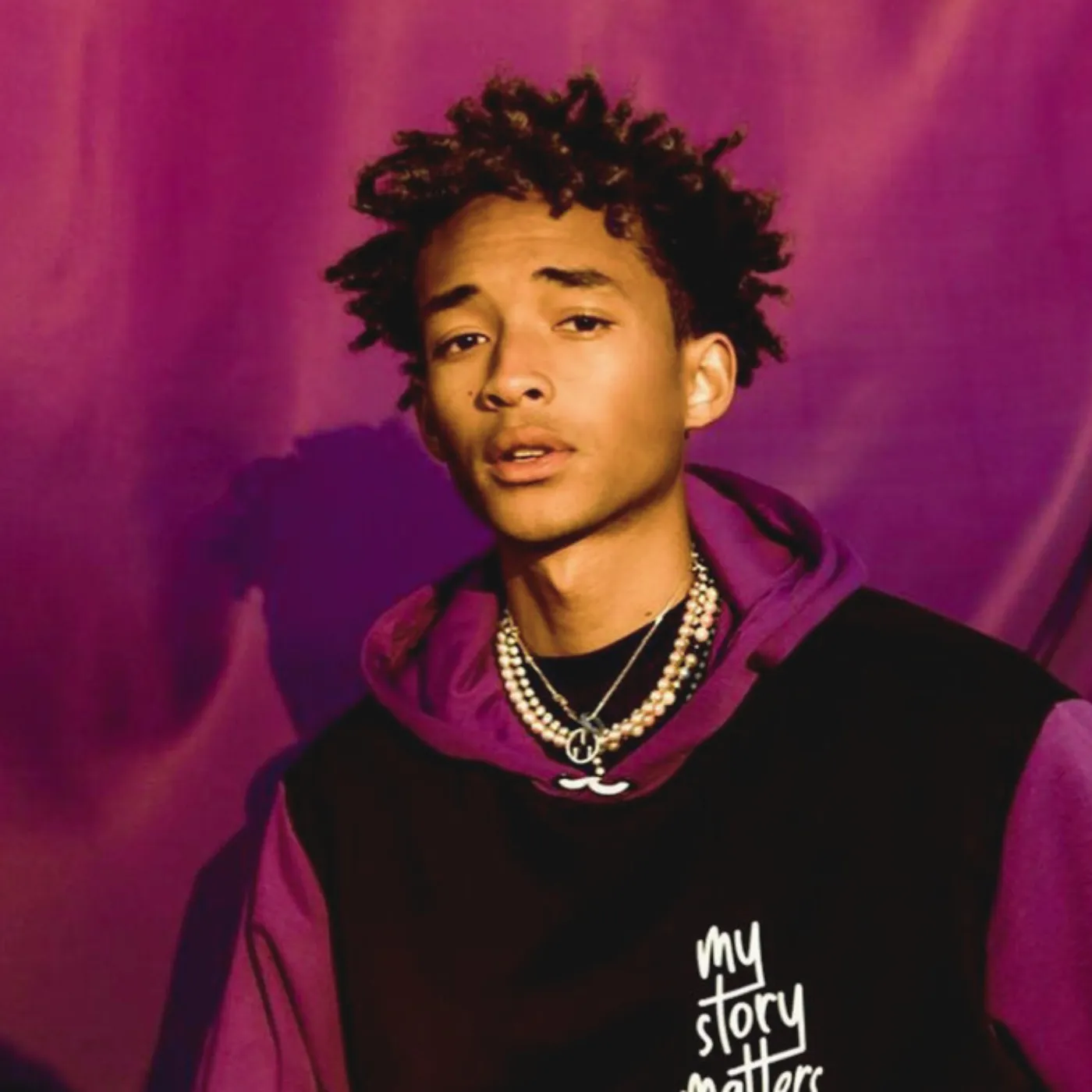

Jaden Smith’s AI Music Experiment Is Blurring the Lines Between Man and Machine
In a rapidly evolving digital world, where artificial intelligence is reshaping nearly every industry, the music scene is now facing a seismic shift. Enter Jaden Smith — actor, musician, and fearless innovator — who’s pushing the boundaries of creativity by teaming up with AI developers to craft an entire album created solely by artificial intelligence.

This groundbreaking project isn’t just another tech experiment — it’s a bold leap into the future of art itself. AI wrote the lyrics, composed the music, arranged the sounds, and even “sang” the songs using digital voice synthesis.
But as this futuristic album drops, it sparks a burning question that’s igniting fiery debates online: Is AI-generated music truly “art”? Or is it the death knell for genuine human creativity?
The Vision: Jaden Smith’s Trailblazing AI Album
For years, Jaden Smith has been known for shaking up the norm — blending fashion, film, and music into a unique cultural signature. But his latest move is a game-changer on a whole new level.
In collaboration with top-tier AI developers, Jaden embarked on a daring project to create an album without traditional human input. This means
No human-written lyrics
No human-performed vocals
No manually crafted instrumentals
Instead, every element was generated, arranged, and produced by AI systems designed to learn, innovate, and replicate music styles.
Jaden himself calls this an “experiment to challenge the creative boundaries between human and machine,” aiming to open doors to a revolutionary direction in music creation.
The Technology Behind the Music
So, how does an AI compose a full album?
It starts with machine learning models fed with enormous amounts of music data — millions of songs spanning decades, genres, and languages. These neural networks learn patterns, structures, emotional cues, and even poetic devices.
Lyrics: AI systems generate lyrics by analyzing themes, rhyme schemes, and emotional undertones found in human-written songs.
Composition: Algorithms create beats, melodies, and harmonies, mixing styles and experimenting with fresh soundscapes.
Vocals: Advanced voice synthesis technology produces digitally generated singing, mimicking pitch, tone, and expression.
This tech isn’t science fiction; it’s cutting-edge AI combined with creative vision — a fusion that pushes past simple automation to real musical innovation.

The Cultural Impact: How Fans and Critics Responded
Since the album’s reveal, social media platforms like Facebook have exploded with conversation. The reactions are a potent mix of awe, excitement, skepticism, and concern.
On one hand, many fans are thrilled:
“Jaden’s always been ahead of the curve, and this project shows where music is heading!”
“AI is the future, and it’s amazing to see an artist embrace it fully.”
“This album is like nothing I’ve ever heard — a true glimpse into tomorrow.”
On the other hand, critics voice serious doubts:
“Music is about human emotion and story. AI can’t feel or tell stories like people do.”
“Is this the end of authentic music? Just machines cranking out tunes?”
“This feels soulless, more tech demo than art.”
The Bigger Picture: What Jaden’s AI Album Means for the Music Industry
This project is more than a novelty; it’s a bellwether for massive industry change. The music business has already seen AI creeping into songwriting, mastering, and marketing. Jaden’s fully AI-created album signals:
An era where artists could collaborate with AI not just as a tool, but as a co-creator or even sole creator.
Lower barriers to music production, empowering new creators with limited resources to produce full albums with AI assistance.
Potential challenges for traditional musicians, composers, and producers who may face competition or need to adapt to new roles.
Record labels and tech companies are watching closely. The success or failure of Jaden’s experiment could spur major investment in AI music startups, reshaping how hits are made and marketed.
The Controversy: Authenticity and Creativity in the Age of AI
This project raises philosophical questions that go beyond music:
What is creativity?
Can a machine truly create something new, or is it just remixing human creations?
Does art require a human soul, or can algorithmic outputs evoke genuine emotion?
Traditionalists argue that music must come from lived experience, passion, and emotion — things machines cannot possess. For them, AI-generated music is a clever mimicry lacking the “spark” that connects artist and audience.
Conversely, innovators claim AI can expand creative horizons, breaking free from human limitations and biases. They argue that tools have always shaped art — from the electric guitar to digital synthesizers — and AI is the next evolutionary step.
Jaden Smith’s AI album becomes the focal point of this debate, forcing fans, artists, and industry players to confront these fundamental questions.
Social Media Explosion: The Facebook Frenzy
Facebook has become the battleground for this AI music debate. Posts and videos about Jaden’s album have gone viral, with thousands of reactions, shares, and heated comment threads.
Key trends on Facebook include:
Massive engagement from younger generations eager to embrace tech and innovation.
Viral meme culture mocking or celebrating the idea of “robot singers.”
Influencers and digital creators are sharing their own AI art experiments inspired by this project.
Live discussions and panels debating the ethical and artistic implications of AI in entertainment.
This high engagement signals that the topic hits a nerve — combining pop culture, cutting-edge tech, and deep existential questions about art.
The Technical Challenge: Can AI Capture Human Emotion?
One of the biggest hurdles for AI music is emotional authenticity. Music isn’t just notes and rhythms; it’s a vehicle for human stories, pain, joy, and connection.
AI can analyze emotional patterns and reproduce effects, but critics argue this is imitation, not true feeling. The question remains:
Can an algorithm understand what it means to feel heartbreak or hope?
Does synthesized singing convey the same warmth or vulnerability as a human voice?
Jaden’s project explores this challenge head-on — the album’s sound tests the limits of AI’s emotional mimicry and invites listeners to decide if they feel moved or detached.
What’s Next? The Future of AI and Music
Jaden Smith’s experiment is just the beginning. Here’s what we might see soon:
More artists are experimenting with AI co-creators for fresh inspiration and faster production.
Custom AI models tailored to individual artist styles, creating hybrid music that blends human and machine creativity.
New legal frameworks around AI copyrights, royalties, and ownership as AI-generated works increase.
Fan experiences are evolving, with interactive AI-driven concerts or personalized music creation.
While some fear AI may replace human artists, others see it as a powerful new instrument that can elevate creativity to new heights.

Final Verdict: Are We Ready to Embrace AI in Music?
The controversy around Jaden Smith’s AI music album reflects a broader cultural moment. We stand at a crossroads, deciding how much of our creativity we want to share with machines.
Will AI become a new artistic partner, unlocking unprecedented innovation? Or will it dilute the emotional core that makes music sacred?
One thing is clear: Jaden Smith’s fearless leap into AI music isn’t just an experiment — it’s a challenge to all of us to rethink creativity for the digital age.


















